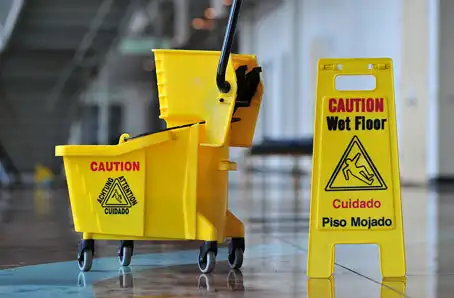
Bidding for janitorial service contracts is an essential part of growing and sustaining your cleaning business. A well-prepared bid can help you secure long-term work, gain new clients, and enhance your reputation. This guide provides an in-depth look at how to craft a winning janitorial service bid, from conducting a thorough walkthrough to preparing a professional proposal that leaves no detail overlooked.
Understanding Janitorial Service Contracts
Before you begin crafting a bid, it’s crucial to understand the different aspects of a janitorial service contract. These contracts typically outline the responsibilities of the janitorial service provider and the client. Each contract will vary depending on the client’s needs, but most will cover tasks like routine cleaning, maintenance, and specialized services such as window washing or restroom sanitation. To help better craft and manage bids, modern technology such as janitorial software can be utilized.
Growth of the Janitorial Industry
The janitorial industry is booming, and that's no surprise. With more businesses prioritizing cleanliness, especially post-pandemic, the demand for reliable cleaning services is skyrocketing. According to industry reports, the janitorial services market is expected to keep growing at a steady rate, driven by demand in healthcare, education, and corporate spaces. Knowing this helps you understand the competitive landscape and spot opportunities for growth.
Types of Services Typically Provided by Janitorial Companies
Janitorial companies offer a wide range of services, including daily office cleaning, floor maintenance, window washing, restroom sanitation, and specialty services like deep cleaning and disinfecting. Understanding what services your company excels at will help you target the right contracts and market your strengths effectively.
Key Elements of a Janitorial Contract
- Scope of Work: This defines the specific tasks the janitorial service provider will be responsible for, such as cleaning floors, emptying trash, or disinfecting restrooms.
- Frequency: The contract should state how often each service will be performed, whether it’s daily, weekly, or monthly.
- Timeframe: A contract’s duration is typically set for a specific period, such as six months, one year, or longer, depending on the agreement.
- Performance Metrics: Clients often set standards that the janitorial provider must meet, which may include cleanliness ratings or regular performance reviews.
- Payment Terms: This section specifies when and how payments will be made, as well as any penalties for late payments or failure to meet agreed-upon standards.
Understanding these key elements will allow you to create a bid that aligns with the client’s expectations and needs.

Preparing Your Business for Contract Bidding
Registering Your Janitorial Business
Before you even think about bidding for contracts, make sure your business is legally registered. This includes getting your business name, securing a tax ID, and setting up a business bank account. You want to appear professional and trustworthy from the get-go.
Acquiring Necessary Certifications and Licenses
Different regions and industries require specific licenses and certifications to offer cleaning services. Some clients may also look for environmental certifications or specialized training in your workforce. Do your homework to ensure you're fully compliant with local regulations.
Understanding Insurance Requirements
Most janitorial contracts will require you to have adequate insurance coverage. This typically includes general liability insurance, workers’ compensation, and possibly janitorial bonding, which protects your clients in case of theft or damages.
Finding Janitorial Service Contract Opportunities
Government vs. Private Contracts
Government contracts tend to offer higher stability and longer-term commitments, but they also have stricter requirements. Private contracts, on the other hand, can be easier to secure but may be shorter term. It’s a good idea to diversify and pursue both types to balance your business portfolio.
Online Platforms and Bidding Websites
There are several online platforms dedicated to connecting service providers with contract opportunities. Websites like BidNet, GovernmentBids and Janitorial Leads Pro offer access to contract listings. You can also check local government websites for public contract opportunities.
Networking and Local Connections
Sometimes the best opportunities come from networking. Attend local business events or join industry associations where you can meet potential clients or hear about contracts up for grabs. Don't underestimate the power of word-of-mouth recommendations!
Online Job Boards
Online job boards like Indeed or Craigslist sometimes have listings for cleaning contracts. These sources may seem somewhat unconventional. But they can occasionally provide leads to potential bidding.
Subscription Services
Subscription services can offer personalized notifications for bid opportunities. Examples of these services include BidLink, TendersPage, and Periscope S2G. While they come at a cost, these services can save time and provide access to a wider range of bids.

Steps to Prepare an Accurate Janitorial Bid
1. Conduct a Detailed Walkthrough
A comprehensive walkthrough of the client’s facility is the first and most crucial step in the bidding process. This allows you to accurately assess the size and complexity of the job. During the walkthrough, pay close attention to:
- Square Footage: Larger spaces typically require more time and resources, which directly affects your bid.
- Types of Flooring: Different surfaces require different cleaning techniques. For example, tile floors may need regular mopping and waxing, while carpets require vacuuming and occasional deep cleaning.
- Facility Usage: Areas that see heavy foot traffic, such as lobbies or hallways, will need more frequent cleaning compared to less-used spaces like storage rooms.
- Special Requirements: Some facilities may have unique cleaning needs, such as medical offices that require disinfecting or industrial sites that need deep sanitation.
Documenting these details during your walkthrough ensures that your bid accurately reflects the scope of work required, avoiding underbidding or overbidding.
2. Calculate Labor Costs
Labor costs are one of the largest components of any janitorial service bid. Properly calculating these costs is critical to ensure you remain profitable while offering a competitive price. Here’s how to do it:
- Estimate Time for Each Task: Based on your walkthrough and the size of the facility, estimate how long it will take to complete each cleaning task. Use industry benchmarks if you’re unsure, but also rely on your experience.
- Determine the Number of Workers: Once you’ve estimated the time required for the job, calculate how many workers will be needed to complete the tasks efficiently. For instance, larger facilities may require multiple cleaning staff to meet deadlines.
- Hourly Wages: Factor in the hourly rate you pay your employees, making sure it’s compliant with local minimum wage laws. Depending on the complexity of the job, you may also need to consider different pay rates for specialized cleaning tasks.
- Include Taxes and Benefits: Don’t forget to include payroll taxes, employee benefits, and insurance costs when calculating labor expenses.
By calculating labor costs carefully, you can ensure your bid covers all necessary expenses while providing a competitive price.
3. Include Cleaning Supplies and Equipment
The next significant cost factor in your bid will be cleaning supplies and equipment. These items should be broken down into two categories: consumables and equipment.
- Cleaning Supplies: Include the costs of all cleaning products such as detergents, disinfectants, paper towels, toilet tissue, and trash liners. You should calculate how much of each supply will be used over the course of the contract.
- Equipment: Certain jobs may require specialized equipment like floor buffers, vacuum cleaners, or carpet extractors. These tools may represent a one-time purchase or a recurring cost for maintenance and repair.
- Maintenance and Replacement Costs: Any equipment you use will eventually need maintenance or replacement. Be sure to factor these costs into your bid to avoid unexpected expenses down the line.
Providing a clear breakdown of supplies and equipment in your proposal shows clients that you’ve thoroughly considered the project’s needs.
4. Determine Overhead and Profit Margins
In addition to labor and supplies, your bid should account for overhead expenses. Overhead includes the general costs of running your business that aren’t tied directly to a specific job but are necessary for your company’s day-to-day operations. Examples of overhead include:
- Office Rent and Utilities: If you have a physical office, include the costs of rent, electricity, and water in your overhead.
- Insurance: Liability insurance, workers’ compensation, and other types of business insurance should be factored into your overhead.
- Administrative Costs: This could include the salaries of office staff, software subscriptions for managing schedules, and communication costs.
Once you’ve calculated your total costs, it’s time to add a profit margin. Typical profit margins for janitorial services range from 10% to 20%, depending on the market and the competition. This margin ensures that you not only cover your costs but also earn a reasonable profit for your efforts.
5. Research Competitor Pricing
It’s essential to know what your competitors are charging for similar services. To remain competitive without undervaluing your work, you can gather information about market rates by:
- Conducting Online Research: Look for industry reports or client reviews that reveal pricing information for janitorial services in your area.
- Networking with Other Vendors: Attending industry events or talking to other professionals can give you insight into common pricing strategies.
- Requesting Quotes: You can anonymously request quotes from competitors to see how they price similar jobs. This helps you understand where your pricing falls in the market.
Competitive pricing is key to winning contracts, but always ensure that your bid reflects the quality of your work and the value you bring.
6. Create a Professional Proposal
Once you have all the necessary calculations, the next step is to create a professional, well-organized proposal. A clear and polished proposal helps make a strong first impression on potential clients and demonstrates your attention to detail. A strong proposal should include:
- Cover Letter: Introduce your company, highlight your experience, and explain why you’re the best choice for the job.
- Scope of Work: Outline the tasks you will perform, the frequency of service, and any special requirements you’ve noted during the walkthrough.
- Pricing Breakdown: Provide a detailed breakdown of labor, supplies, overhead, and profit margins, so the client can see where their money is going.
- Timeline: Include start and end dates for the contract, as well as the schedule for recurring services.
- Terms and Conditions: Specify the payment terms, including due dates and accepted payment methods, as well as any warranties or guarantees you offer.
A well-structured proposal will differentiate you from competitors and help you secure more contracts.
Just starting? Try our free janitorial estimate PDF template
Building Long-Term Client Relationships
Securing a janitorial service contract is just the beginning. To build a successful and sustainable business, you must focus on nurturing long-term relationships with your clients. Here are key strategies for building these relationships:
- Consistently High-Quality Service: Always meet or exceed the client’s expectations. Delivering excellent service consistently will establish your company’s reliability and professionalism.
- Regular Communication: Keep lines of communication open with your clients. Regular updates and check-ins help address any concerns early and show that you’re committed to client satisfaction.
- Flexible Solutions: Sometimes, a client’s needs change. Being adaptable and offering flexible solutions beyond the initial scope can increase customer loyalty and lead to contract renewals.
- Request Feedback: Always seek feedback on your services. Clients appreciate it when you ask for their opinion, and you can use their feedback to improve service quality.
Client Retention Tips
- Incentives for Long-Term Contracts: Offering discounts or incentives for longer contract periods can encourage clients to commit to your services for the long term, reducing your need to constantly seek new contracts.
- Detailed Reporting: Provide clients with reports on the work completed and any relevant performance metrics. This transparency builds trust and showcases the value of your services.
Conclusion
Bidding for janitorial service contracts requires meticulous planning, detailed cost calculations, and a professional approach to proposal presentation. By understanding the scope of work, calculating labor and supply costs accurately, and conducting market research, you can create competitive bids that reflect the value you offer. Following this comprehensive guide will help you not only win contracts but also build strong, long-term client relationships that are the foundation of a successful janitorial business.
